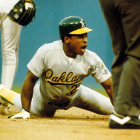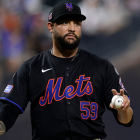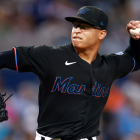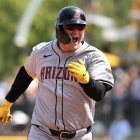Last Thursday night's Brewers-Cardinals game was both a typical and atypical one for Milwaukee. For one thing, they won, smoking St. Louis 12-5. Nearing the end of their third losing season in the past four years, that kind of one-sided win is rare.
On the other hand, the way they won has been quite common this season. The Brewers stole three bases against the Cardinals, adding to a stolen-base total that leads the majors by a mile.
The three thieves who did the deed have been swiping all year long, rating as three of the most prolific basestealers in the game, and also massive bargains for the rebuilding Brewers.
The success of Jonathan Villar, Hernan Perez, and Keon Broxton and the near-zero cost that came with acquiring them raises a question. With teams long ago catching on to the value of on-base percentage, plus defense, and other previously undervalued commodities, could good, old-fashioned jackrabbits be baseball's next big market inefficiency?
Through 144 games, the Brewers have stolen 159 bases. That's a huge number by present-day standards, one that dwarfs the next-highest total, the Reds' 122. With a pace of 178 over 162 games, the Brewers would bag more bags than any other team has in the past seven years, and the most by a National League team in nine years.
So, is that by design?
"More than anything it's probably a reflection that we view good baserunners as adding to the value proposition of a team," said Brewers general manager David Stearns. "I can't say we set out to acquire players who might lead the league in stolen bases. We also try to expand beyond stolen bases, to get good baserunners who have the ability to impact the game in other ways as well. We've seen that from those three guys."
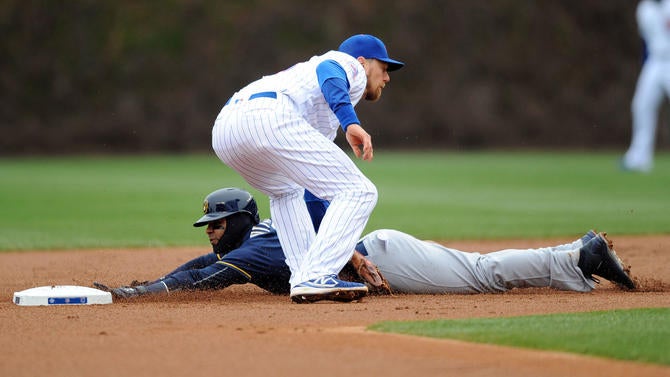
Though Stearns won't cop to coveting a league leader, Villar's on the verge of getting there. He has 53 steals this season, second in MLB and only five behind Billy Hamilton of the Reds. Hamilton is out with an oblique injury and there is no timetable for his return.
Long known for his speed, Villar stole 30 or more bases every season from 2010 through 2015 across multiple levels of pro ball. Problem was, his offensive numbers lagged. In his first major league season (2013), Villar batted just .243/.321/.319; in year two he hit just .209/.267/.354. He put up better numbers in 2015, batting .284/.339/.414 -- but that wasn't enough to keep the starting job in Houston, not with all-world prospect Carlos Correa ready to crash the big leagues.
When the Brewers hired Stearns to take over as their new GM last September, Villar immediately sprung to mind as a potential buy-low candidate, especially with Correa having knocked him out of a job. Two months later he pulled the trigger, nabbing Villar for the moderate price of talented but non-elite Single-A pitching prospect Cy Sneed.
The results have blasted past everyone's expectations. Villar's batting .292/.372/.454. By park-adjusted offense, he's been the fourth-best hitter among all batting title-qualified shortstops this year, ranking just ahead of 2015 AL Rookie of the Year runner-up Francisco Lindor, and just a smidge behind the 2015 AL Rookie of the Year winner. Some guy named Carlos Correa. That's not all. Villar's defense has improved, as he ranks 10th among all shortstops in Defensive Runs Saved.
We can even frame Villar's season historically. In the history of baseball, only 10 shortstops have ever totalled 15 homers, 50 steals, and 65 walks in a season...and Villar is one of them.
"At the time we saw a 24-year-old shortstop who'd already played parts of three seasons in the major leagues," said Stearns. "We could see the underlying tools and skills were there. He had a chance to take off, and so far this year he has."
Many of the same characteristics crop up when you evaluate Perez and Broxton. Though Perez's acquisition predated Stearns' arrival in Milwaukee, Perez was also a 24-year-old burner with hefty stolen-base totals but also holes in his game. He'd also seen snippets of big league action for a few years, struggling most of that time. And he too has enjoyed a big breakout season this year, batting .276/.306/.453, slugging 13 homers and stealing 30 bases in 106 games. He's not as polished a player than Villar, striking out five times more than he's walked this year. Still, consider what it cost for the Brewers to get him -- nothing more than a waiver claim from the Tigers last June, one that looks like a monumental steal now.
Broxton also cost next to nothing, coming to the Brewers in exchange for 32nd-round pick and fringe corner infielder Jason Rogers in December. A third-round pick in his own right back in 2009, Broxton didn't get the same multiple shots at the Show, instead spending seven seasons in the minors while only a seven-game cup of coffee with the Pirates last year. After starting this season back at Triple-A, he got called up in May. The results, again, have been pleasantly surprising, with Broxton batting .244/.360/.415, stealing 22 bases in just 71 games. He has one of the weirdest skills profiles in the game for a speedster, combining to strike out and walk in more than half his plate appearances. Still, by taking a flyer on a speedster, the Brewers have unearthed yet another bargain.
Stearns sees opposite-field power he didn't expect in Perez, and credits the work he's done with his current and past hitting coach Darnell Coles for much of that improvement. Broxton has made adjustments too, making a mechanical change in his setup and swing by lowering his hands, which in turn has allowed him to get to balls faster and keep his hands in the hitting zone for longer.
But the common denominator for all three players comes down to that old scouting principle: Find players with as many of the five tools as possible, and hope they can improve their skills as they mature. Power doesn't come cheap, nor does playing great defense, or hitting well. That leaves speed, an element that Villar, Perez, and Broxton share, and one that could inform future decisions made by the Brewers, as well as other teams hoping to find value in a player acquisition market where everyone's out trying to do the same thing.
Stearns sees one more lesson in the speedy trio's accomplishments this year too.
"It takes players time," he said. "A lot of times it's challenging to do well in the majors at a young age. You can lose sight of the fact that what made that player a top prospect is still there. So you have to be patient with young players who perhaps have struggled starting off in the majors -- give them time to get comfortable.
"I don't know if that's revolutionary. But especially as an organization going through a younger cycle like we are, sometimes you don't see true talent in their first season in the big leagues. The best you can do is look for those underlying tools and skills."
Those slower developers are dotted throughout major league rosters -- Brandon Phillips, Nelson Cruz, and Jose Bautista to name just three. The Brewers now hope they have three more of those late bloomers. If Villar, Perez, and Broxton continue to thrive, the Crew can take these lessons...and run with them.















